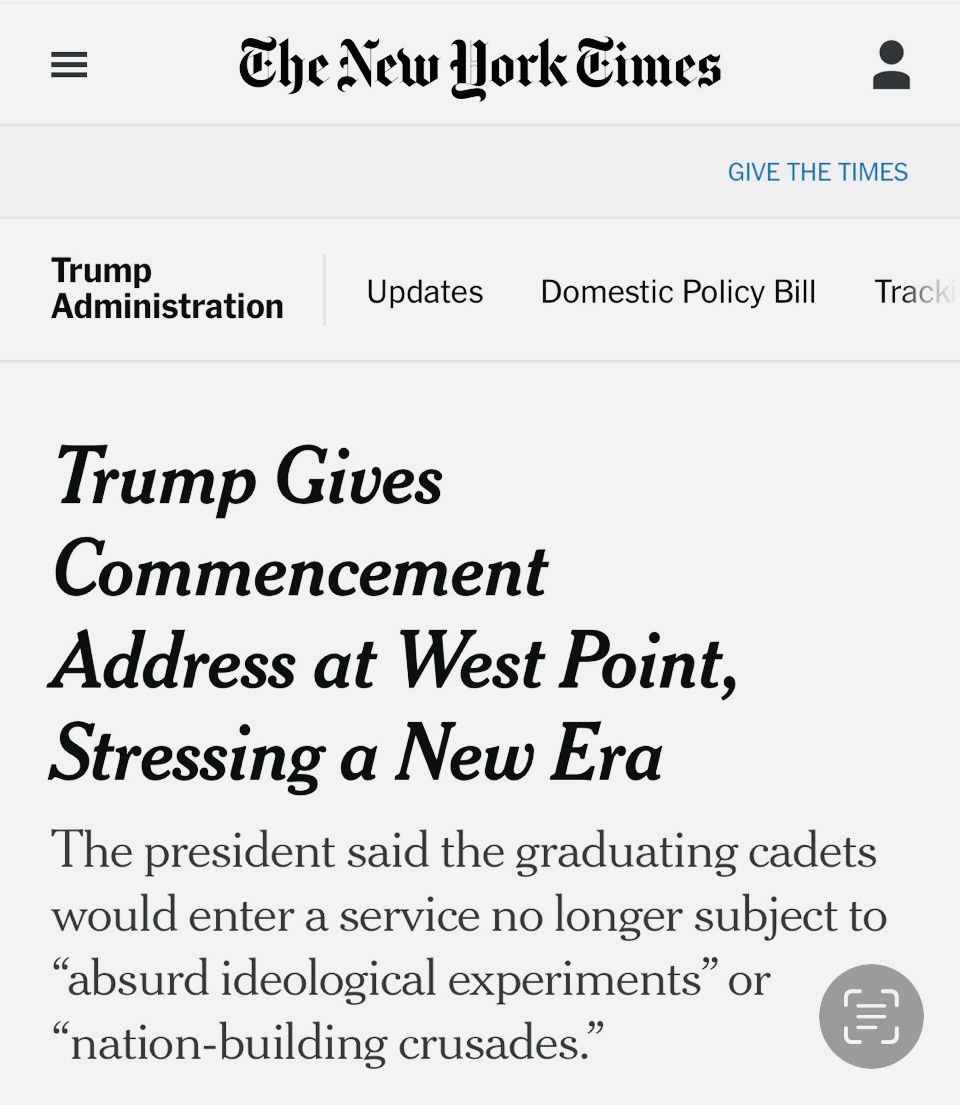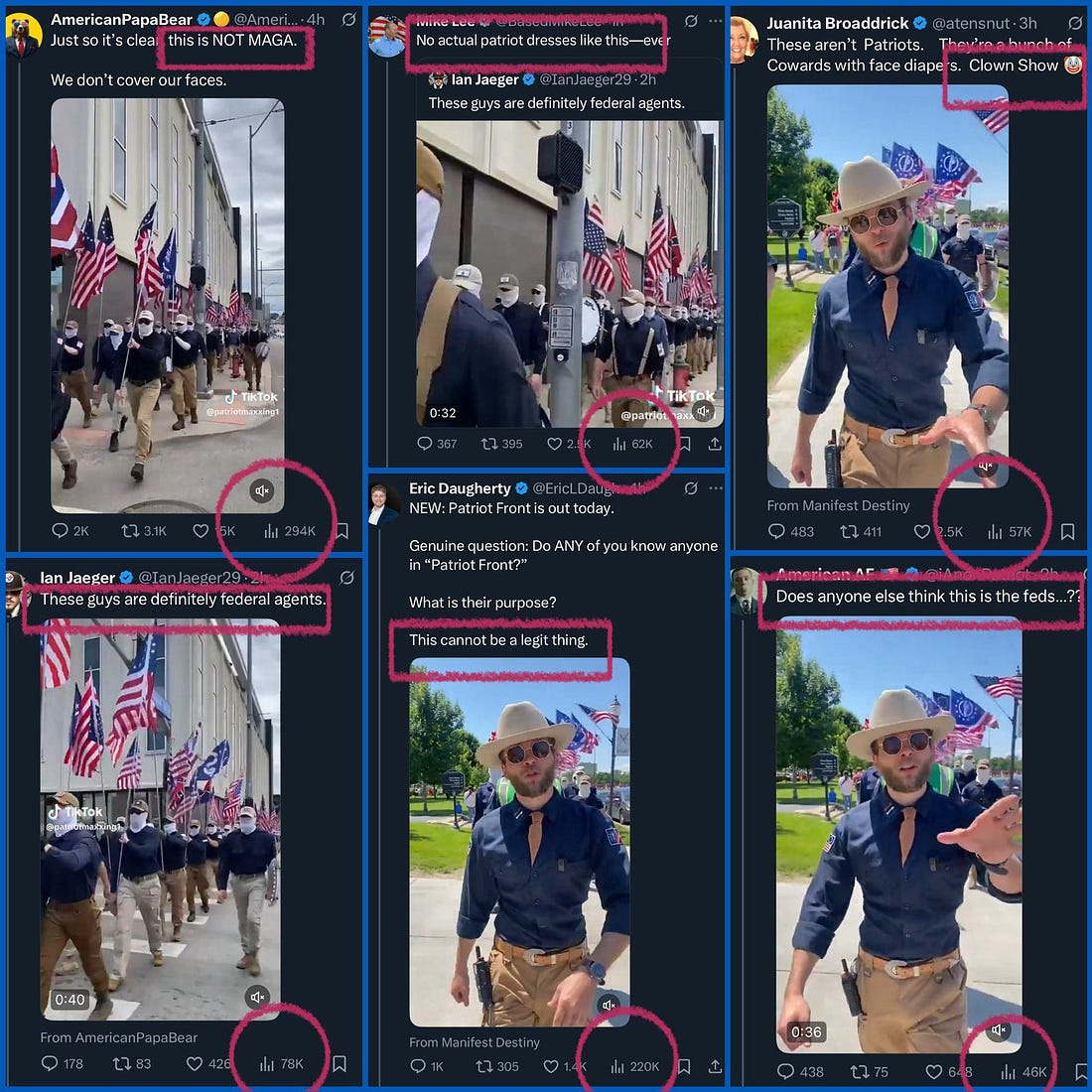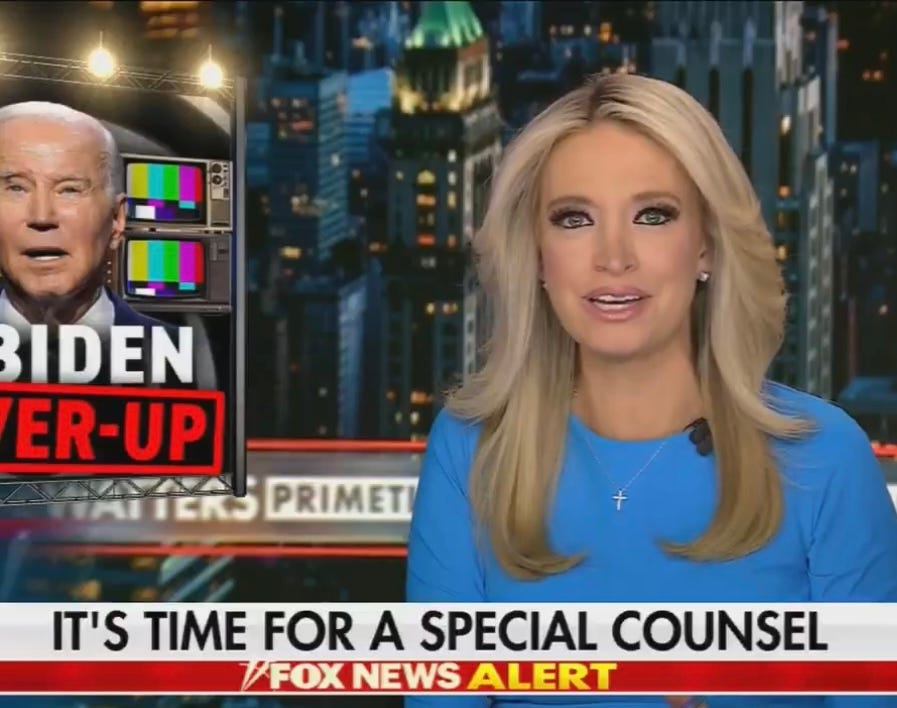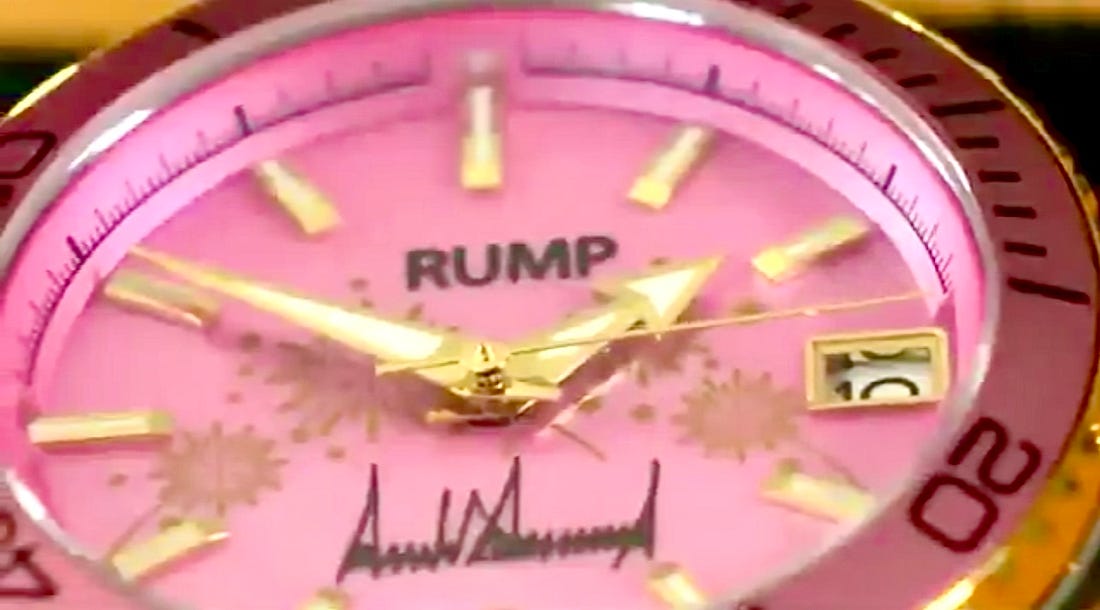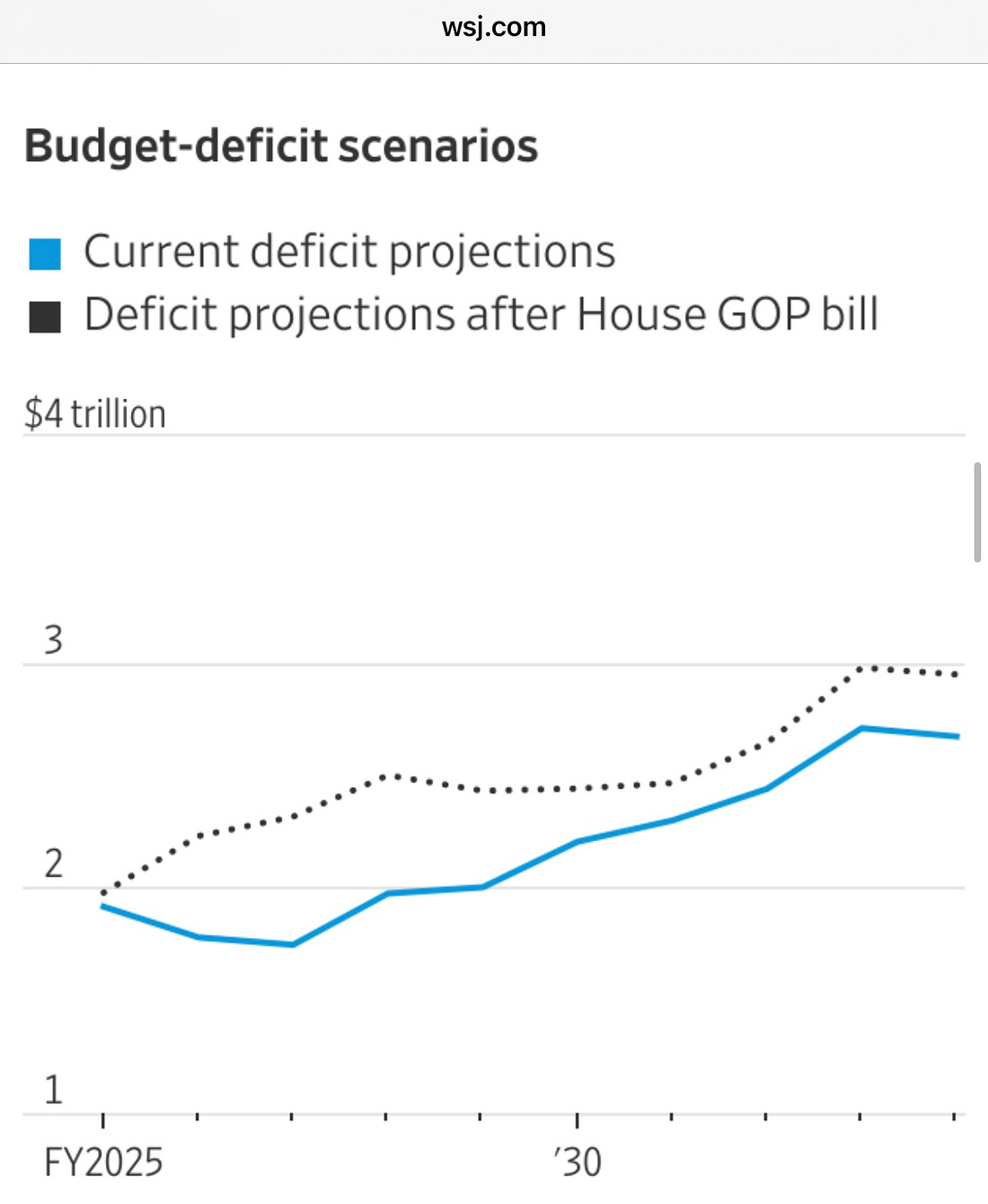… US taxpayers will pay the family of J6 insurrectionist Ashli Babbitt nearly $5 million after the Trump admin agreed to settle a wrongful death lawsuit. The Biden admin previously opposed any settlement. 33% of the settlement will be paid out to Tom Fitton’s Judicial Watch and VA lawyer Richard Driscoll.
… Sen. Ruben Gallego (D-AZ): “Paying money to a terrorist’s family using US Tax Payer dollars. The hundreds of Police injured that day should be compensated.”
… Capitol Police Chief Tom Manger to his staff per CBS: "I told them I was extremely disappointed, and I disagreed with the DOJ’s decision to settle."
… A Trump supporter bought a limited addition Trump watch for $600 as a special gift for his MAGA wife, but was upset when it came in and was missing the ‘T’ in Trump. So she ended up getting a ‘Rump’ watch and he was unable to get anyone to send him a new one. To NBC10 (Cranston, RI): “I’m very disappointed. I wanted it to be a special thing for her. And we expected that it would have the integrity of the president. Someone has dropped the ball big time. An apology would be nice for making my wife cry.”
… It does have the integrity of the president. And real MAGA never apologizes or admits a mistake. He should know that by now. This was the watch:
… Naomi Biden after reading Jake Tapper and Alex Thompson’s book about her grandfather: “Just read a copy of this silly book, and if anyone is curious for a review from someone who lived it first-hand: this book is political fairy smut for the permanent, professional chattering class. The ones who rarely enter the arena, but profit from the spectacle of those that do. Put simply, it amounts to a bunch of unoriginal, uninspired lies written by irresponsible self promoting journalists out to make a quick buck. It relies on unnamed, anonymous sources pushing a self-serving false narrative that absolves them of any responsibility for our current national nightmare. All of this at the expense of a man so completely good and honest that it is impossible for these people to ever understand the why or how of it all.”
… I’m not going to fill up with Bulletin with all the nonsense that Republicans put out since Biden’s cancer diagnosis. Basically they have decided to add this with the stuff in the Tapper/Thompson book to claim that Biden insiders also covered up cancer along with cognitive decline. Here is just a few to give you the general idea of what they are saying:
JD Vance: "Whether the right time to have this conversation is now or some time in the future, we really do need to be honest about whether the former president was capable of doing the job."
Rep. Warren Davidson (R-OH): "I feel terrible for anybody that would go through that, even someone who I really don't like much as Joe Biden. But they're not credible on anything they've done. The whole thing was a big coverup, and I suspect this cancer diagnosis is part of that whole scheme.”
Sen. Markwayne Mullin (R-OK): "It's interesting the timing of them releasing the cancer. It seems like since the Hur tapes were released, they're like, 'Hey wait, it might be a good time to distract the American people and talk about his cancer.'
… Trump’s new DOJ Pardon Attorney Ed Martin says the stuff in the Tapper book may be used by him to try to nullify Biden’s pardons: “The integrity of the American Pardon system requires that we examine the Biden pardons and who did what. We will get the bottom of it. Count on us.”
… Tapper is launching his book tour this week by going on Biden-hater Megyn Kelly’s podcast. She said they are friends. Plus she’s got a big audience of Biden-haters and he needs to sell books.
… CNN’s Brian Stelter had to turn off the comments on his post suggesting that the news about Biden’s diagnosis may have been put out because of Tapper’s book and Axios releasing recordings of Biden. Obviously people weren’t happy about it. This is what he said: “Extraordinary timing – according to his spokesman, Biden received this cancer diagnosis on Friday, the same day audio clips of his Robert Hur interview were all over the news.”
… Trump finally had his phone call with Putin today, and posted this after: “Russia and Ukraine will immediately start negotiations toward a Ceasefire and, more importantly, an END to the War. Russia wants to do large scale TRADE with the US when this catastrophic ‘bloodbath’ is over, and I agree. There is a tremendous opportunity for Russia to create massive amounts of jobs and wealth. Its potential is UNLIMITED. Likewise, Ukraine can be a great beneficiary on Trade, in the process of rebuilding its Country. Negotiations between Russia and Ukraine will begin immediately. Let the process begin!”
… Trump has threatened Putin with sanctions 4 separate times if he didn’t sign a ceasefire immediately. Putin has refused and continues to make excuses and drag out negotiations while refusing to participate in them by attending himself or sending senior members of his govt. Meanwhile, Trump does nothing while continuing to claim that everything is going well.
… WSJ Chief Foreign Affairs Correspondent Yaroslav Trofimov: “The ‘peace’ talks demanded by Trump are now the excuse why he is not imposing additional sanctions or Russia or supplying additional aid for Ukraine. A win-win for Putin. He has no costs for insisting on maximalist demands (an end of independent Ukraine) and no pressure from the US to stop bombing Ukrainian cities and killing Ukrainians while meaningless talks drag out, potentially for years.”
… Fox Chief Political Analyst Brit Hume: “So Putin has agreed to talk. Isn't that what he did last week when he sent a delegation to Turkey?”
… JD Vance on Air Force Two to CNN: “I think honestly that President Putin, he doesn’t quite know how to get out of the war.”
… Sen. Tommy Tuberville (R-AL): "Vladimir Putin is to the point where he has taken so much land, he's making so much progress - why would he make a deal? He has got the cards in his hand. Putin is gonna want a lot from the Ukrainians. He's gonna want a lot in terms of land, possibly even Odessa, he's gonna want Crimea, but he's gonna want NATO to stay away from his borders, and I can't blame him for that."
… Former US Ambassador to Ukraine Bridget Brink, who just resigned in protest, on CBS: “I resigned because the policy of the Trump admin is to put pressure on the victim – Ukraine, rather than on the aggressor. Russia and Putin have invaded a sovereign, independent, democratic country in the heart of Europe with the help of N. Korea, Iran and China. This is fundamentally against US interests. The war needs to end, but peace at any price is not peace at all. It's appeasement. Appeasement only leads to more war.”
… Brink: “Russia’s economy is hurting. They have 21% interest rates, 10% inflation. Now’s the time to increase the pressure on Russia to bring Putin to the table, not decrease it. My strong advice is not to give a single meeting, concession or legitimacy until Putin agrees to an unconditional verifiable ceasefire and moves toward just and lasting peace.”
… Sec of Defense Pete Hegseth on Fox today: “If young men and women want woke garbage, then they can go to college. If they want to train to be a warrior and be a part of something bigger than themselves and raise their right hand and seek purpose and honor and duty, join the US military.”
… CNBC on Moody’s lowering the US credit rating: “The debt downgrade pressured bond prices, sending yields higher, at a time when the economy is already awaiting the full impact of Trump’s unfolding tariff policy. The 30-year US bond yield traded above 5% on Monday and the 10-year yield topped 4.5%, levels that hurt equity markets last month and helped lead Trump to back off his stiffest tariff measures. Rates on mortgages, car loans and credit cards track the 10-year yield.”
… Press Secretary Karoline Leavitt was asked about it today: “When you look at the world, the world has confidence in the USA and our economy once again. People around the world have confidence in us again.”
… She was also asked about the Republican budget bill exploding the deficit, which is a huge reason for the lower rating: “This bill does not add to the deficit.”
… But WH economic advisor Kevin Haslett admitted to Fox host Maria Baritromo that it does. Maria: “Moody's downgraded the credit rating on the US, talking about higher deficits. What do you want to say about House Republicans who are complaining about raising the debt ceiling? HASSETT: “It's going to go up. So people should just be done with it and raise the debt ceiling.”
… Former Treasury Sec. Lawrence Summers: “Scott Bessent dismissed Moody’s downgrade of the US as a lagging indicator. Can he seriously believe it has nothing to do with the failure of the DOGE to achieve significant cuts or the Admin’s sweeping tax cut proposals or Admin’s threats with respect to foreign countries who finance a sizable share of our federal debt?
… Bartiromo to Haslett: There's still a lot of uncertainty on the part of corporate America. What do you want to say to companies who say, okay, we're in this 90 day pause, but this 90 day pause will end and we'll return to reciprocal tariffs? HASSETT: “What's going to happen is there's going to be a lot of trade deals and firms are going to lift off. All of America knows that the golden age is coming. I think you are going to look at a second half of the year will be way north of 3% growth, probably north of 4%.”
… Sen. Bill Hagerty (R-TN) was asked on CNBC what Trump will do if Walmart raises prices because of tariffs despite Trump saying he will be watching them: “I think they're going to be very careful about how they do this. I know they've received criticism from the president. I think they need to think hard about it.”
… Reporter to Haslett outside the WH: You told us before "liberation day" that you had 15 countries that were on the brink of making a deal. It's been 2 months and you have one deal. HASSETT: “No. There have been a whole bunch of deals. So you don't think the deal with China counts as a deal? We have an agreement in principle with India.”
… A total surrender on China and concepts of a deal with India. So much winning.
… Reuters reported that Vietnam, who has been in intense negotiations with the Trump admin to get the 46% tariffs lifted that were recently imposed on their country, is now negotiating with Eric Trump to build a new Trump Tower in Ho Chi Minh City. Eric is going to Vietnam this week. Vietnam has already offered to reduce all tariffs on goods from the US to zero and authorize Elon Musk’s Starlink for their country.
… Tariffs aren’t the issue for the Vietnamese buying US goods. The issue is cost - with or without tariffs. So that isn’t going to get a deal done. But a Trump Tower Ho Chi Minh probably will.
… Rep. Ronny ‘Candyman’ Jackson (R-TX): “President Trump is BRILLIANT! EVERY country wants to make a deal. America is RESPECTED AGAIN!”
… Sen. Marsha Blackburn (R-TN): “No longer will we reluctantly settle for ‘Made in China.’ ‘Made in America’ is the new standard.”
… In the middle of the night, Republicans on the House Budget Committee were finally able to pass the first hurdle by getting it out of committee, but only after 4 of them who voted ‘No’ two days ago agreed to vote ‘Present’ this time around. The next hurdle is the Rules Committee, which has scheduled their vote for Wed at 1:00 AM. Yes, that’s 1 in the morning.
… Sen. Elizabeth Warren (D-MA): “Republicans are scheduling votes in the DEAD OF NIGHT on Trump's ‘big, beautiful bill.’ They advanced their bill last night at 10:30PM. The next vote is scheduled for 1AM on Wednesday. Why hide? Maybe because this bill rips away health care from babies, new moms, and seniors.”
… Rep. Jim McGovern (D-MA): “If Trump’s big beautiful bill is so great, why not debate it when people are still awake? Why are you debating it at 1 AM?”
… Rep. Scott Perry (R-PA): “It’s far from ready. Washington’s typical mantra, ‘spend now and save later’ (only the ‘save’ part never happens) doesn’t comply with the budget framework we agreed upon. I stand with my colleagues on the Budget Committee (Reps. Roy, Brecheen, Clyde, and Norman) who voted ‘present’ to move the bill forward out of respect for the Republican Conference and the President. Now we work harder this week to get the job done right – especially since America’s credit rating was just downgraded. We can and must do better for the American People.”
… Rep. Chip Roy (R-TX): “The bill does not yet meet the moment. We can and must do better before we pass the final product. I joined with 3 of my colleagues to vote ‘present’ out of respect for the Republican Conference and the President to move the bill forward. It gives us the opportunity to work together this week to get the job done in light of the fact our bond rating was dropped yet again due to historic fiscal mismanagement by both parties.”
… Rep. Keith Self (R-TX): “Congress has more work to do. I remain a NO. Delaying spending cuts is Washington code for kicking the can down the road.”
… Sen. John Curtis (R-UT) told CNN that he will not vote for unless serious changes are made to the current blueprint: “When it comes to debt and deficit, we're not being honest.”
… Rep. Michael Cloud (R-TX): “Let’s be clear, the bill still falls short, allowing our $36 trillion debt to keep growing. As it heads to the floor, negotiations must continue. We have a narrow window to get this right. We cannot afford to waste it.”
… WSJ: “The plan won’t reduce federal budget deficits and would make America’s fiscal hole deeper. The current proposal would increase projected budget deficits by nearly $3 trillion through 2034, locking in tax cuts and spending increases that outweigh reductions in spending on Medicaid and nutrition assistance. While Republicans, who have vowed to reduce red ink, say higher economic growth will fill the gap, budget analysts across the political spectrum have panned the Republican plan, warning that it worsens the US fiscal picture.”
… Romina Boccia, with the libertarian Cato Institute: “While Republicans were campaigning on reducing spending and controlling the growth in the debt, once they put pen to paper, their real priorities demonstrate that they care a lot more about cutting taxes.”
Today was a crazy news day with things coming from lots of different places that were completely unrelated to each other. So it was hard to keep up, I did my best, and if anything it gave me a chance to show off my range! I’m afraid I have to warn you that things are only going to get a lot crazier as this Bulletin continues.
If you missed the Weekend Bulletin, you can find it here.
… Karoline Leavitt invited right-wing conspiracy theorist ZEROHEDGE to attend the WH Press Briefing in the ‘New Media Chair’, and he got to ask the first question. This is the complete transcript of what he asked:
"President Trump posted on Truth Social a video highlighting what most people call the Clinton body count, which is the strange number of suicides that seem to happen in Clinton circles. I have a headline here from the WaPo that said, 'Trump peddles false conspiracy theories tying the Clintons to several deaths. The death of Mark Middleton, who was a former Clinton WH aide, who was found dead on a Clinton Foundation property. I'll just quote from the Arkansas Times: Middleton apparently shot himself in the chest with a shotgun and also hung himself from a tree with an extension cord. So I have no idea how somebody commits suicide that way, but if the WaPo is here, maybe you can enlighten us as to how that was actually a suicide. That's just a lead in to my question about the most famous Clinton-related suicide, which is that of Jeffrey Epstein. There's still a lot of questions around that case. You've released phase one of the Epstein files. What was missing from that is any connection to his ties to intelligence agencies. And that's really the whole story, that not just trafficking young girls, but doing it on behalf of intelligence agencies, and even potentially as part of a blackmail ring with potential ties to the Israeli government. For phase two, when can we expect it? Will it have information pertaining to those aspects of the Epstein case?"
… Leavitt responded to the insane clown show she created: "I know the Attorney General has committed to releasing those files. I would defer you to DOJ on her timeline, but when she has made a promise in the past, she has kept it, and I'm certain that she will in this case as well."
... Alex Jones isn’t happy with Kash Patel and Dan Bongino’s interview about Epstein on Fox: “This claim that Epstein’s death is not a cover-up I call bullshit. Epstein confirmed a suicide? Maria sits down with FBI's Kash Patel and Dan Bongino, who claim Epstein did, in fact, commit suicide. Now, let's get into why people do not believe this theory. We know the Comey's are corrupt. James Comey just sent out a dogwhistle to have our sitting president assassinated. Why do you think he would do that? What is Comey, the Clintons, and the Obamas all have to hide? Remember, there are no coincidences. Do you think they're telling the truth?”
… Marge Greene’s boyfriend, RAV correspondent Brian Glenn, says MAGA is not happy about the fact that James Comey and other Deep Staters haven’t been arrested yet by Patel and Bondi: “People are angry. Forget about the Big Beautiful Bill - people want Big Beautiful Handcuffs on some of these people! I’m very disappointed in the progress of all of this. I have very little hope we will have any accountability.”
… Comey was on MSNBC to talk about SeaShellGate: “86 to me means to leave a place, to ditch a place. People were saying it is some sort of call for assassination - which is crazy. I don't want to be associated with violence of any kind.”
… Fox’s Pete Doocy had the next question at Leavitt’s presser, and he continued Very Serious Questioning from right-wing media: “What does President Trump mean when he says that Taylor Swift is no longer hot?” Leavitt: “Look, he is speaking about Taylor Swift's political views and how perhaps it has impacted the support of the American public for her work. I will leave it at that.”
… Melania Trump had a cameo on the WH lawn, where she read a speech warning that social media can be used to brainwash people: “AI and social media are digital candy for the next generation — sweet, addictive, and capable of shaping beliefs, emotions, and even causing harm.”
… Peter Navarro is upset that Mike Pence keeps ripping Trump: “Mike hereby completes his ex-communication from MAGA/Trump America. Now Mike's simply a useful idiot for the legacy media, RINOs, and Radical Dems who want to take down Trump. The saddest part is that Pence dreams of running for prez again in 2028 and thinks he has a chance.”
… Pence said yesterday that he does not intend to run for president ever again.
… CNN on Trump’s missile defense shield plan: “In January, Trump ordered SecDef Hegseth to present options for developing and implementing Golden Dome within 60 days. But the WH did not receive those plans until weeks after the President’s original deadline. Whatever option Trump opts for, it won’t be cheap: $25B has been carved out in next year’s defense budget for the system, but the Congressional Budget Office has estimated the US could have to spend more than $500B.”
… “The project will also present a bonanza for private contractors as the govt won’t be able to build it alone, with companies including Elon Musk’s SpaceX in the running for highly lucrative contracts related to the system.
… JD Vance canceled his trip to Israel tomorrow. Axios: “Vance decided against traveling to Israel this week because he didn't want to be validating the Israeli decision to expand the war in Gaza. A senior Israeli official said today that as of Sat, Vance and his team thought a hostage and ceasefire deal was imminent and thus the timing would be good for a visit, but when it became clear the next day a deal was unlikely they decided not to travel to Israel.”
… So when he thought he could show up and claim credit for something he was going to go. But since there is nothing but a US-sponsored humanitarian disaster he bailed.
… The Gaza Govt Media Office: "Famine is worsening, and the Gaza Strip requires 500 aid trucks and 50 fuel trucks daily. Famine indicators and the humanitarian collapse are escalating at a terrifying pace, threatening the lives of over 2.4 million people. There is an urgent need to bring in 50 fuel trucks daily to operate bakeries, hospitals, and water and sewage pumping stations. The Strip is facing a full-scale humanitarian disaster as dozens of bakeries shut down. Hospitals are going out of service one after another, and residents are being deprived of the most basic necessities of life. Hunger and malnutrition are spreading, especially among children, the sick, and the elderly.”
… Trump post at 1:43 AM: “HOW MUCH DID KAMALA HARRIS PAY BRUCE SPRINGSTEEN FOR HIS POOR PERFORMANCE DURING HER CAMPAIGN FOR PRESIDENT? WHY DID HE ACCEPT THAT MONEY IF HE IS SUCH A FAN OF HERS? ISN’T THAT A MAJOR AND ILLEGAL CAMPAIGN CONTRIBUTION? WHAT ABOUT BEYONCÉ? AND HOW MUCH WENT TO OPRAH, AND BONO??? I am going to call for a major investigation into this matter. IT’S NOT LEGAL! For these unpatriotic ‘entertainers,’ this was just a CORRUPT & UNLAWFUL way to capitalize on a broken system.”
… He then woke up and posted this later in the morning: “THIS IS AN ILLEGAL ELECTION SCAM AT THE HIGHEST LEVEL! IT IS AN ILLEGAL CAMPAIGN CONTRIBUTION! BRUCE SPRINGSTEEN, OPRAH, BONO AND, PERHAPS, MANY OTHERS, HAVE A LOT OF EXPLAINING TO DO!!!”
… President of CBS News Wendy McMahon abruptly resigned, stating “it’s become clear the company and I do not agree on the path forward.” NYT reports it directly relates to the lawsuit filed by Trump against 60 Minutes that major shareholder Shari Redstone wants to settle: “Her embrace of Owens and ‘60 Minutes’ put McMahon at odds with Paramount executives who were anxious about the show’s reporting about the Trump admin.”
… Politico did a study showing how Trump and Republicans have stopped talking about Musk: “Some Republicans have come to see Musk as politically toxic, which Democrats have been trying to leverage. The Tesla CEO’s approval rating has dropped across most groups, including independents and voters without college degrees. Polling from Data for Progress found most voters wanted Musk out of govt at the end of his 130-day period as a special employee that’s set to expire at the end of in May — or even sooner.”
… A GOP operative: “He’s finished, done, gone. He polls terrible. People hate him. He’d go to Wisconsin thinking he can buy people’s votes, wear the cheese hat, act like a 9-year-old. It doesn’t work. It’s offensive to people.”
… Residents in an area near Elon Musk’s new xAI facility in Memphis are being exposed to huge amounts of toxic pollution. CNN: “AI is immensely power-hungry, and Musk’s company installed dozens of gas-powered turbines, known to produce a cocktail of toxic pollutants. The company currently has no air permits, appearing to rely on a loophole for temporary turbines.”
… “Gas-powered turbines produce pollutants, including nitrogen oxides, a key component of ozone pollution — also called smog — which can cause asthma attacks and chest pain and, in the longer-term, is linked to decreased lung function and premature death. They also generate the carcinogen formaldehyde and tiny air pollution particles so small they can pass through lungs into people’s bloodstream. Aerial images taken by the Southern Environmental Law Center and South Wings, an organization of volunteer pilots, in March showed xAI had 35 turbines at the facility.”
… The Supreme Court ruled today that the Trump Admin has the authority to strip Venezuelans of the Temporary Protected Status. Immigration expert Aaron Reichlin-Melnick: “Today's action is the single largest mass-illegalization event in US history. 350,000 people woke up this morning with legal status, living and working here with official permission. They'll go to bed as undocumented immigrants facing deportation.”
… Kid Rock responded to the story that his restaurant sent migrant workers in the kitchen home early to avoid having them arrested in an upcoming ICE raid: “I do not have anything to do with day to day operations at my Honky Tonk. That being said, I 100% support getting illegal criminals out of our country no matter where they are.”
… Kid Rock was out again Saturday night with Rep. Lauren Boebert (R-CO).


